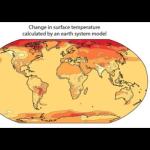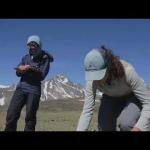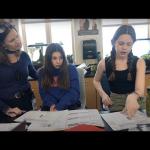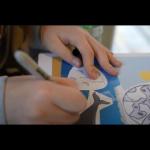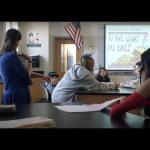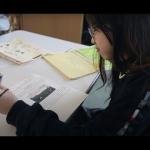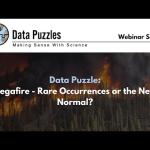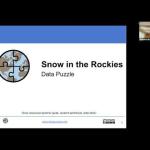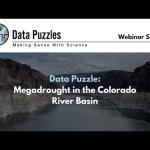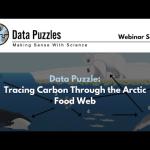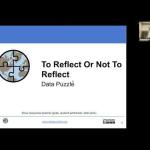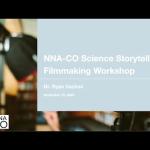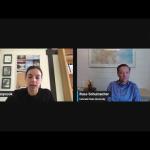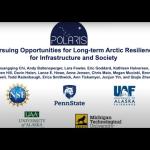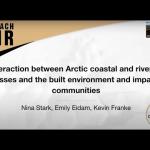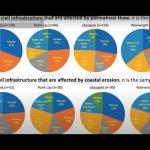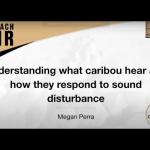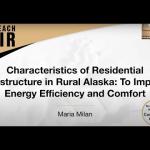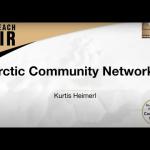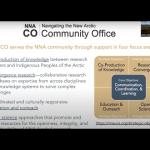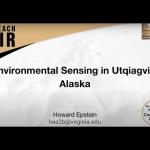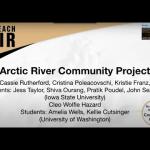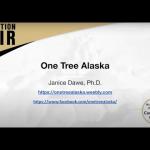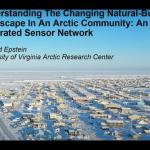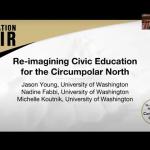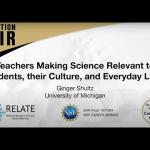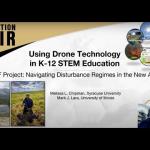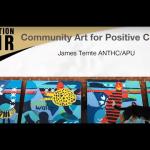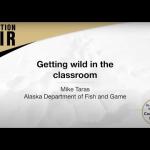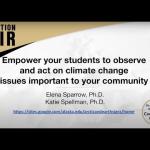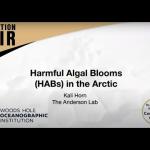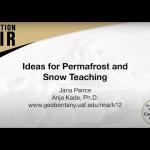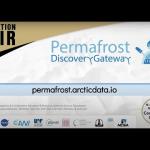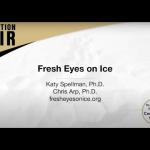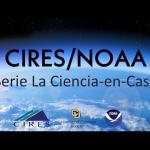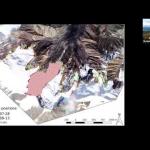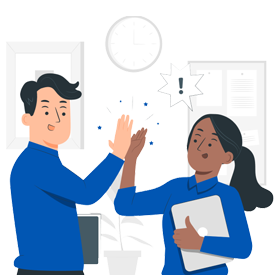Professional Learning
This video can be used a stand along video to learn more about fire ecology, or as part of the wildfire Data Puzzles lessons.
Recorded Science Talks
Science Show and Share
This recording captures the Oct. 2, 2024 Data Puzzle webinar focused on the Not All Warming is Equal lesson in which students analyze global temperature and carbon dioxide datasets to explore the inequities of climate change. Please find the landing page and slide deck referred to in this recording below:
How To Videos
A 'Behind the Puzzles' piece, which illustrates the goals and process of a study tracking flowering times of alpine species of plants. Interview provided courtesy of Dr. Meredith Zettlemoyer of the University of Montana's Plant Ecology Lab.
Science Content Video
In this video, middle school science teacher Erin Mayer describes how she engaged her students with the Supporting Ongoing Changes in Thinking practice in the context of the "Tracing Carbon Through the Arctic Food Web" Data Puzzle. Note that Erin used this Data Puzzle as part of a larger learning expedition (unit).
How To Videos
In this video, middle school science teacher Erin Mayer describes how she engaged her students with the Constructing Evidence-Based Explanations practice in the context of the "Tracing Carbon Through the Arctic Food Web" Data Puzzle. Note that Erin used this Data Puzzle as part of a larger learning expedition (unit).
How To Videos
In this video, middle school science teacher Erin Mayer describes how she engaged her students with the Eliciting Students' Ideas practice in the context of the "Tracing Carbon Through the Arctic Food Web" Data Puzzle. Note that Erin used this Data Puzzle as part of a larger learning expedition (unit).
How To Videos
In this video, middle school science teacher Erin Mayer describes how she engaged her students with the Identifying Important Science Ideas practice in the context of the "Tracing Carbon Through the Arctic Food Web" Data Puzzle. Note that Erin used this Data Puzzle as part of a larger learning expedition (unit).
How To Videos
In this Data Puzzle, students will engage with an interactive reading before analyzing authentic datasets to discover how and why the number of megafires has changed over time
How To Videos
This recording captures the Feb. 21, 2024 Data Puzzle webinar focused on the Snow in the Rockies lesson in which students analyze snowfall and timing of snowmelt datasets from Colorado's East River Watershed and reflect on how changing snow conditions in Rocky Mountain watersheds like the East River Watershed might impact downstream water users (e.g., Colorado River water users). Please find the landing page and slide deck referred to in this recording below:
How To Videos
Declining water levels in two of the largest reservoirs in the United States, Lake Powell and Lake Mead, provide visible evidence for the ongoing megadrought (a period of extreme dryness that lasts for decades) in the Colorado River Basin. Scientists studying weather and climate in this region are analyzing temperature and precipitation patterns over time to determine the root cause of the ongoing megadrought.
How To Videos
In this Data Puzzle, students analyze and interpret authentic data to trace the amount and type (ocean algae vs. sea ice algae) of carbon-based fat in Arctic animals to determine whether the animal's diet is more dependent upon ocean algae or sea ice algae and ultimately make predictions about how Arctic organisms large and small may be impacted by the decline in sea ice.
How To Videos
In this Data Puzzle, students will engage with an interactive reading before analyzing authentic datasets to discover how and why the number of megafires has changed over time.
How To Videos
This recording captures the Jan. 31, 2024 Data Puzzle webinar focused on the To Reflect Or Not To Reflect lesson in which students analyze Arctic sea ice and albedo datasets to explore the Arctic amplification phenomenon. Please find the landing page and slide deck referred to in this recording below:
How To Videos
In this filmmaking workshop lead by producer, script writer, videographer, and editor Dr. Ryan Vachon (Provare Media) attendees learned about crafting project mission statements, storyboards, camera and audio gear, and basic editing techniques.
Skill Development Videos
Discover the intricate web of climate, drought, and climate change in the Southwestern US in this engaging 25-minute talk and 20-minute LIVE Q&A. Our seasoned climatologist, Russ Schumacher, will explore Colorado's climate, the significance of mountain snowpack, and the path of water to rivers. Uncover key climate metrics like temperature and precipitation and their impact on water resources. Explore the diverse nature of drought, its definitions, and its evolving face under the influence of climate change.
Recorded Science Talks
Science Show and Share
In this pre-summit event, experts will discuss how to support women and youth in climate action.
Community Resilience & Climate Action Videos
Recorded Science Talks
Examining climate impact on food, people, and landscapes with social and physical scientists: Place based curricula, workshops, and Research Experiences for Teachers. Speakers: Polaris Team. This video is part of the NNA Community Office Flashtalk series.
Recorded Science Talks
Interaction between Arctic coastal and riverine processes and the built environment and impacts on communities. Presented by Nina Stark, Emily Eidam, & Kevin Franke.
Recorded Science Talks
Effects of permafrost degradation and coastal erosion on four Alaska North Slope Borough coastal communities: Survey through knowledge co-production. Presented by Ming Xiao & Min Liew.
Recorded Science Talks
Presented by Megan Perra
Recorded Science Talks
Characteristics of Residential Infrastructure in Rural Alaska To Improve Energy Efficiency & Comfort
Recorded Science Talks
Presented by Kurtis Heimerl
Recorded Science Talks
Presented by Jennifer Schmidt
Recorded Science Talks
Presented by Howard Epstein
Recorded Science Talks
Presented by Cassie Rutherford, Cristina Poleacovschi, & Kristie Franz
Recorded Science Talks
Learn about OneTree Alaska
Recorded Science Talks
Environmental sensor network - getting students and teachers involved in understanding the changing landscape in an Arctic Community. Speaker: Howard Epstein. This video is part of the NNA Community Office Flashtalk series.
Recorded Science Talks
Re-imagining Civic Education for the Circumpolar North. Speakers: Jason Young, Nadine Fabbi, Michelle Koutnik (University of Washington). This video is part of the NNA Community Office Flashtalk series.
Recorded Science Talks
Teachers Making Science Relevant to Students, their Culture, and Everyday Lives. Speakers: Ginger Shultz, University of Michigan. This video is part of the NNA Community Office Flashtalk series.
Recorded Science Talks
Using Drone Technology in K-12 STEM education. Speakers: Melissa L. Chipman, Syracuse University & Mark J. Lara, University of Illinois. This video is part of the NNA Community Office Flashtalk series.
Recorded Science Talks
STEM at the Poles! Research Experiences for Formal and Informal Educators in the Polar Regions. Speakers: Janet Warburton, Education Project Manager, Arctic Research Consortium of the U.S. This video is part of the NNA Community Office Flashtalk series.
Recorded Science Talks
Community Art for Positive Change. Speakers: James Temte ANTHC/APU. This video is part of the NNA Community Office Flashtalk series.
Recorded Science Talks
Getting Wild in the Classroom. Speakers: Mike Taras & Alaska Department of Fish and Game. This video is part of the NNA Community Office Flashtalk series.
Recorded Science Talks
Polar Educators International [PEI] - Join us in Iceland in April 2022. Connecting polar education, research, and the global community. This video is part of the NNA Community Office Flashtalk series.
Recorded Science Talks
Empower your students to observe and act on climate change issues important to your community. Speakers: Elena Sparrow, Ph.D. & Katie Spellman, Ph.D. This video is part of the NNA Community Office Flashtalk series.
Recorded Science Talks
Connecting Educators with Harmful Algal Bloom (HAB) Research - Research Cruise Outreach, Workshops, and Resources. Speakers: Kali Horn & The Anderson Lab. This video is part of the NNA Community Office Flashtalk series.
Recorded Science Talks
Engaging Youth to Explore Snow and Permafrost in an Arctic Village. Speakers: Jana Peirce & Anja Kade, Ph.D. This video is part of the NNA Community Office Flashtalk series.
Recorded Science Talks
Announcing the Permafrost Discovery Gateway: A new resource for scientists, teachers and anyone interested in big permafrost data in the Arctic. Speakers: Jen Moss & Anna Liljedahl. This video is part of the NNA Community Office Flashtalk series.
Recorded Science Talks
Observe river and lake ice with your students to contribute to winter travel safety and climate change research. Speakers: Katie Spellman, Ph.D & Chris Arp, Ph.D. This video is part of the NNA Community Office Flashtalk series.
Recorded Science Talks
La candidata a doctorado Claudia Corona presentará sobre impactos de precipitación extrema bajo la superficie.
Recorded Science Talks
In this stand alone webinar, Mylène Jacquemart talked about her research working to identify triggers of sudden glacier detachments: destructive glacial process that buried kilometers of Alaskan forest.
Recorded Science Talks

